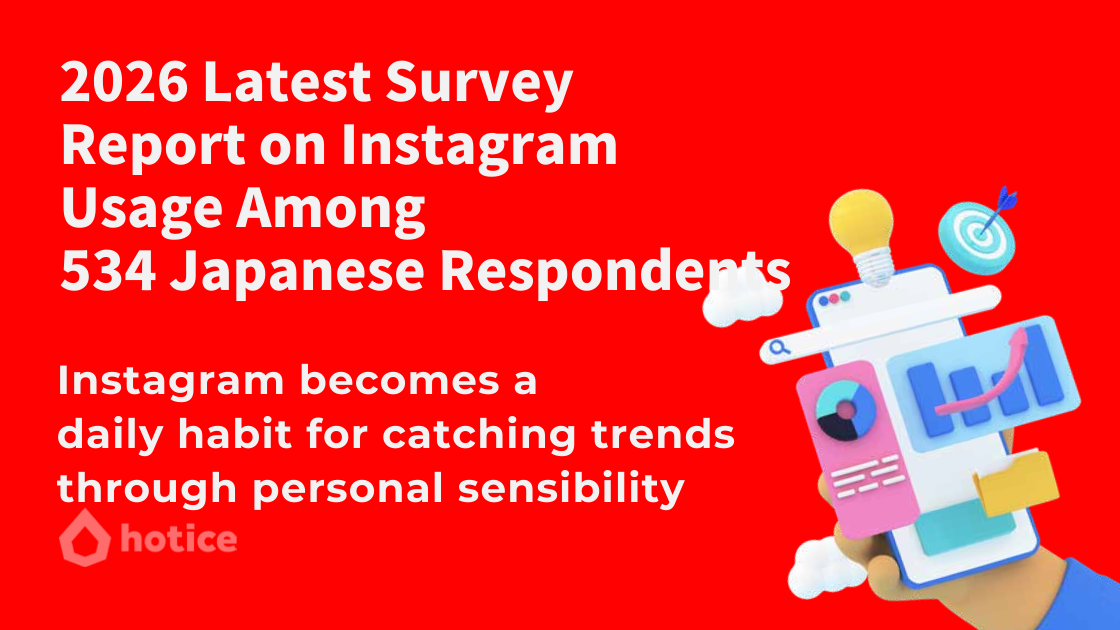Social Media Trends in Japan for 2024

- 1. 1. Introduction: What is the Social Media Landscape in Japan?
- 2. 2. Japan’s Popular SNS Rankings and CharacteristicsPopular SNS Platform Rankings and the Unique Features of Each Platform (Demographics and Usage Purposes)
- 2-1. TikTok
- 2-2. Instagram
- 2-3. YouTube
- 2-4. Twitter (X)
- 2-5. LINE
- 2-6. Facebook
- 2-7. Twitch
- 3. 3. Japan’s Unique SNS Culture and Trends
- 3-1. Emphasis on Anonymity in Japanese SNS Culture
- 3-2. The Power of “Hobby Communities”
- 3-3. Pursuit of Aesthetic Excellence
- 3-4. Local Businesses’ Use of SNS
- 4. 4. Comparison Between Japan and the World
1. Introduction: What is the Social Media Landscape in Japan?
- The High Adoption Rate of Social Media in Japan and Mobile-Centric Usage
- Unique Culture and Usage Compared to Other Asian Countries (e.g., the Importance of Anonymity)
- Global Platforms vs. Domestic Platforms
Japan’s social media (SNS) usage has evolved uniquely compared to other Asian countries. In 2023, the number of social media users in Japan reached approximately 105.8 million, and it is projected to increase to 113.6 million by 2028 (Ministry of Internal Affairs and Communications).
Over 100 million people in Japan, representing more than 80% of the total population, use social media in some form. Most users access these platforms through mobile devices, with smartphones being the primary mode of usage, particularly among younger generations and those in their 50s. This high adoption rate can be attributed to the country’s extensive internet penetration (91% of the population) and widespread smartphone usage.
Japanese social media users exhibit distinctive demographics and cultural traits compared to other Asian countries. For instance, LINE enjoys an exceptionally high penetration rate in Japan, with around 94 million users as of 2023, making it a staple for daily communication. Some of LINE’s popularity stems from its multifunctionality, such as free voice and video calls, in-app money transfers, and features for gifting and sharing with friends, all of which are deeply integrated into daily life.
Meanwhile, global social media platforms such as Facebook, Instagram, and X (formerly Twitter) also remain popular, though they showcase unique usage patterns and user demographics (Ministry of Internal Affairs and Communications).
Another distinctive aspect of Japanese social media culture is its emphasis on anonymity, a reflection of societal preferences for privacy and avoiding social scrutiny. This is particularly prominent in a country with a densely populated and socially intertwined structure, where users often wish to keep their social media accounts hidden from colleagues, supervisors, or even friends. As a result, pseudonyms and character icons are preferred over real names. This anonymity contrasts starkly with other Asian nations and is valued for maintaining psychological distance among users.
Furthermore, Japan’s Instagram user base exceeds 66 million, while YouTube has over 71.2 million Japanese users, highlighting the widespread adoption of global platforms. Nevertheless, domestic platforms like LINE and, though less commonly now, Mixi, retain a notable share of the market. This dual structure underscores the uniqueness of Japan’s social media landscape (White Paper on Information and Communications in Japan, 2023).
2. Japan’s Popular SNS Rankings and Characteristics
Popular SNS Platform Rankings and the Unique Features of Each Platform (Demographics and Usage Purposes)
Now, let’s delve into more detail about the standing of each SNS platform in Japan. (Reference: Gaiax materials)
In Japan’s SNS market, TikTok, Instagram, and YouTube continue to dominate. Twitter (now known as “X”) and LINE also maintain strong support, while domestic platforms retain a unique presence.
TikTok
TikTok is primarily dominated by younger users, focusing on entertainment and short-form videos. By 2024, its monthly active users (MAUs) in Japan are estimated to reach approximately 17 million (Gaiax report).
Key Characteristics of TikTok:
- Demographics: The primary user base consists of teenagers and individuals in their 20s. Popular content themes include entertainment, fashion, and makeup.
- Purpose of Use: Users primarily engage in discovering and sharing information through entertaining short-form videos. The platform’s algorithm enhances user engagement by effectively suggesting relevant content.
As a visually-driven social media platform, Instagram is particularly popular among people in their 20s and 30s, especially women. Its user base in Japan is approximately 66 million (Gaiax report).
Key Characteristics of Instagram:
- Demographics: Primarily used by people in their 20s and 30s who are in the purchasing demographic, with a significant proportion of female users.
- Purpose of Use: Sharing lifestyle, fashion, and food content. The platform’s expanded shopping features have made it a gateway for e-commerce. Additionally, trends such as searching for information directly within Instagram using hashtags and its search interface, instead of traditional search engines, are gaining traction.
YouTube
YouTube is widely used across various age groups, especially for long-form videos dedicated to learning, entertainment, and product reviews. It boasts over 71.2 million MAUs in Japan (Gaiax report).
Key Characteristics of YouTube:
- Demographics: The platform caters to a broad audience, from children to senior citizens, with learning, gaming commentary, entertainment, and product reviews being particularly popular.
- Purpose of Use: Providing in-depth information and entertainment through long-form videos. It also serves as a vital tool for gathering diverse types of information.
Twitter (X)
Twitter, now known as “X,” is valued for its focus on anonymity and real-time updates, making it a popular platform for news and marketing campaigns. Its MAUs in Japan are approximately 66.5 million (Gaiax report).
Key Characteristics of Twitter (X):
- Demographics: Used by a wide age range, with users who prioritize real-time updates and trends.
- Purpose of Use: Gathering news and trend-related information, as well as engaging in anonymous discussions. The platform is also increasingly used for viral marketing and promotional campaigns.
LINE
LINE is Japan’s primary daily communication tool, holding a unique position not seen in other countries. Its MAUs in Japan are around 95 million (Gaiax report).
Key Characteristics of LINE:
- Demographics: Utilized by a broad age range, particularly families and individuals aged 30 and above.
- Purpose of Use: Daily communication through features like stickers and group chats. Business usage is also growing, with functions like LINE Pay and official accounts.
Unlike other visually-oriented social media platforms, Facebook excels in reaching users seeking text-based posts and professional connections. In Japan, Facebook’s MAUs are estimated to be around 26 million (Gaiax report).
Key Characteristics of Facebook:
- Demographics: Primarily used by business professionals and families aged 30 and above. While its use among younger generations has declined, it remains popular for corporate networking and brand promotion.
- Purpose of Use: Focused on business and professional information exchange. It is also commonly used for event announcements, hobby groups, and targeted advertising, thanks to its precise targeting capabilities.
Twitch
Twitch is a social media platform specializing in live streaming, particularly popular among gamers and fans of entertainment content. Its MAUs in Japan are estimated at approximately 4 million (THE COO report).
Key Characteristics of Twitch:
- Demographics: The main user base consists of individuals in their 20s and 30s who are interested in gaming and eSports. While male users dominate, female creators and viewers are steadily increasing.
- Purpose of Use: Primarily used to deliver real-time entertainment through live streams. Popular content includes gaming commentary, eSports events, and live Q&A sessions. Additionally, non-gaming content like music, cooking, and talk shows is on the rise. Unique to Twitch are features like tipping and subscriptions, which allow creators to monetize their content effectively.
3. Japan’s Unique SNS Culture and Trends
- Emphasis on Anonymity
- The prevalence of anonymous accounts in Japan can be attributed to cultural factors and a strong emphasis on privacy.
- The Power of “Hobby Communities”
- Niche communities centered around fetishes or subcultures thrive on Japanese SNS platforms.
- Pursuit of Aesthetic Excellence
- Japanese SNS users have a unique dedication to the quality of their posts and photos, such as beautifully plated food and scenic landscapes.
- Local Companies’ Use of SNS
- Many local businesses prioritize localized content and region-specific campaigns to engage their audiences.
Emphasis on Anonymity in Japanese SNS Culture
In Japanese SNS culture, anonymous accounts are predominant due to a strong emphasis on privacy and a cultural tendency to avoid conflict. Many Japanese users prefer not to reveal their real names or faces when expressing themselves online, as it allows them to maintain a sense of safety and freedom in their interactions. This stands in stark contrast to the “real-name principle” common in Western countries, where transparency and accountability are prioritized over privacy. The emphasis on anonymity highlights the role of SNS as a space where users can escape the constraints of real-life relationships. This cultural background is also one of the reasons behind the popularity of VTubers in Japan.
The Power of “Hobby Communities”
Japanese SNS platforms are vibrant with niche communities centered around hobbies and subcultures. These communities bring together individuals who share specific interests, fostering deep and meaningful connections. For example, “fetish” culture, in this context referring to a strong fascination with particular elements (such as materials, shapes, movements, or lighting), enjoys considerable popularity. Additionally, communities centered on anime, manga, games, figurines, and cosplay highlight Japan’s unique subcultures. SNS platforms in Japan play a crucial role in showcasing and sharing these “otaku” cultures with the world.
Furthermore, hashtag culture is well-developed, with tags like #おうちカフェ (#HomeCafe) and #DIYインテリア (#DIYInterior) driving trends and community engagement. This hobby-driven usage of SNS is particularly prominent on platforms like Twitter (now X) and Instagram, underscoring the significant role SNS plays in Japan’s digital landscape.
Pursuit of Aesthetic Excellence
Japanese SNS posts often demonstrate an unparalleled dedication to visual quality, especially in categories such as food and landscapes. Beautifully arranged meals and seasonal photos that emphasize visual appeal are highly valued. On Instagram, this focus on aesthetics translates into higher-quality posts, making it an essential platform for brands and tourist destinations looking to capture the Japanese market. This pursuit of beauty goes beyond simple information sharing, establishing SNS as a platform for artistic expression.
Local Businesses’ Use of SNS
Japanese corporate accounts prioritize creating localized campaigns and content tailored to regional audiences. By highlighting region-specific products and services, they aim to build stronger connections with local communities. Many companies also leverage the “yuru-chara” phenomenon—friendly mascot characters created for regional or corporate promotion—to enhance approachability on SNS. For instance, Twitter has seen an increase in humorous posts from official accounts that showcase brand personality. These strategies help narrow the gap between businesses and consumers, boosting engagement and fostering loyalty on SNS platforms.
4. Comparison Between Japan and the World
Differences in SNS Usage
- Greater “passive use” of SNS in Japan compared to other countries, with a focus on viewing rather than actively posting.
- The significant influence of “flame culture” (public backlash) and the need for risk management strategies to avoid controversies.
Relationship Between SNS and Consumer Behavior
- High dependency on “word-of-mouth” among Japanese users when making purchasing decisions.
- A unique approach to influencer marketing in Japan, highlighting the roles of both Key Opinion Leaders (KOLs) and micro-influencers for targeted engagement.
Scale and Growth Rate of Japan’s SNS Advertising Market
- Comparisons with other Asian countries such as China, South Korea, and Southeast Asia, showcasing Japan as a mature and stable market.
- Distinctive marketing strategies within Japan, including detailed targeting and storytelling-driven content to build trust and connect with consumers.
Differences in SNS Usage
In Japan, there is a notable tendency for people to use SNS passively compared to other countries. Many users prioritize viewing information and consuming others’ posts rather than actively sharing their own. This behavior stems from cultural norms that discourage excessive self-disclosure and concerns over the risks of public backlash (known as “flame culture”). This unique aspect of Japanese SNS culture has a significant impact, making companies and individuals cautious about what they post or say online.
The Relationship Between SNS and Consumer Behavior
Japanese users tend to place significant emphasis on reviews and word-of-mouth when choosing products or services. The reputation of a product or service on SNS can greatly influence purchasing decisions. In influencer marketing, while Key Opinion Leaders (KOLs) with a large follower base are highly effective, micro-influencers specializing in niche fields often deliver equally impactful results. For instance, creators focusing on gadgets or niche categories like gaming gear or bedding have shown better outcomes for targeted campaigns. As a result, companies are increasingly opting for influencers that align closely with their target audience when planning SNS campaigns.
Scale and Growth Rate of Japan’s SNS Advertising Market
Japan’s SNS advertising market has demonstrated steady growth, particularly when compared to other Asian countries such as China and South Korea, which have seen more rapid increases. As a mature market, Japan’s growth remains stable. One distinctive feature of SNS marketing in Japan is its emphasis on detailed targeting and storytelling-style advertisements, such as short dramas that build trust and resonate with consumers. This is partly due to Japanese consumers’ tendency to lose interest upon seeing the “PR” label on advertisements, which has driven companies to create less overtly promotional content. Additionally, Japanese consumers value quality and reliability in advertisements, leading companies to invest heavily in high-quality ad production and carefully crafted official account content.
5. Key SNS Trends to Watch in 2024
Further Expansion of Short-Form Videos
- The growing influence of TikTok, Instagram Reels, and YouTube Shorts
- Successful case studies of corporate campaigns leveraging short-form videos
Potential of Live Commerce
- Predictions for progress in the Japanese market, which lags behind other countries
- Strategies to maximize engagement through live streaming
AI-Generated Content and SNS
- Advancements in AI-generated posts, including images and text creation
- Ethical concerns and platform regulations surrounding AI-generated content
The Growth of VTubers
- Increasing popularity and diversification of VTubers
Further Expansion of Short-Form Videos
@tuckinshuichiro 最新作の透明カメラメガネは話せるらしいので検証しました。 #Meta ♬ オリジナル楽曲 – 修一朗
@onumaaaan 別人級に変われちゃう 韓国のヘアメイクがすごすぎた🥹🎀 ヘアメイクお願いするだけで その日のクオリティまじで変わってくる笑 次予約取れなくなったらやだから 本当は教えたくない…😮💨笑 バチ盛れした記念に撮影もしたいなって方は 提携のフォトスタジオもセンス抜群なので ここがおすすめです📷 韓国のプロのヘアとメイク、カメラマン さんのおかげで新しい自分に会えて嬉しいすぎた🥲💘 場所は聖水(ソンス) どちらもDMで予約できるよ✍️ \ ヘアメイク💇♀️💄 / 「FREAK」 ▼SALON @freak._.official ・HAIR @freak_dduddeong 💰約130,000ウォン ※ヘアメイクの種類によって変動するので希望のスタイルを問い合わせしてみてね✍️ 📍Freak on the 1st floor of Seongsu-ro 147, Seongdong-gu, Seoul \ フォトスタジオ📷 / 「RAVE」 ▼@ravestudio_official 💰1コンセプト150,000ウォン〜 📍서울 성동구 광나루로4가길 12-7 지하1층 #韓国旅行 #韓国 #korea #koreatrip #韓国メイク #聖水 #ソンス ♬ オリジナル楽曲 – おーぬまん
Continued Expansion of Short-Form Video Platforms
In 2024, the influence of short-form video platforms such as TikTok, Instagram Reels, and YouTube Shorts is expected to continue growing. This format, which captures users’ attention in a short time, is not only utilized for entertainment but also for educational content and product promotions. Creative short-form videos have become key to sparking consumer interest quickly, and success stories in Japan are on the rise. Additionally, algorithms tend to prioritize the distribution of short-form videos, leading more brands to join this trend.
Potential of Live Commerce
Live commerce, which has seen significant success in markets like China and Southeast Asia, has yet to gain widespread traction in Japan. Despite preparations by various companies and the availability of platforms like TikTok Shop, no platform has yet achieved significant success in live commerce within the Japanese market. While live demonstrations of products on Instagram Live and soliciting tips during live streams have become commonplace, the concept of live commerce remains underdeveloped. Many overseas companies express interest in expanding live commerce into Japan, but the reality often falls short of expectations. The industry anticipates notable advancements by 2026, but for now, it remains a challenging landscape.
AI-Generated Content and SNS
With advancements in AI technology, the use of AI-generated content in SNS posts is becoming increasingly common. For example, AI-generated images and text allow for efficient and high-quality content creation while mitigating human risks such as influencer scandals or public backlash. However, issues like fake news and copyright violations associated with AI-generated content have raised ethical concerns and the need for platform regulations. Additionally, as people grow accustomed to AI, engagement with content identified as AI-generated is beginning to decline. McDonald’s, for instance, ran a campaign using AI-generated advertisements but faced significant criticism on Twitter (now X).
AI♡ポテト#月曜からポテトML250円#AIラブポテト
— マクドナルド (@McDonaldsJapan) August 17, 2024
※タップしてご覧ください pic.twitter.com/WFOUmHeJ0c
Looking ahead to 2025 and beyond, it will be crucial to leverage AI while addressing these challenges to effectively incorporate it into SNS marketing strategies. A notable recent example is McDonald’s in Japan, which actively utilized AI-generated content in its advertising. This serves as a benchmark for the future potential of AI-driven content.
- Vtuberさらなる普及と多様化
In 2024, Japan’s VTuber culture continues to expand and diversify, with new genres such as education and product reviews emerging alongside traditional content like game streaming and singing. Companies managing popular VTuber groups such as Nijisanji and Hololive have gone public, each achieving record-breaking sales. Leveraging anonymity and a sense of familiarity, VTubers excel at engaging with their audiences, establishing robust revenue models through super chats, events, and merchandise sales.
Collaborations with businesses are also on the rise, with VTubers increasingly being used for product promotions and as brand mascots. Their high audience engagement rates translate into significant purchase conversions, making them highly attractive to marketers. Additionally, efforts to penetrate international markets are accelerating, with many VTubers adopting subtitles or bilingual streaming to reach a global audience.
On the technological front, innovations in AI and VR have enabled the creation of more realistic avatars and interactive experiences in the metaverse, paving the way for new forms of entertainment. As a result, Japanese VTubers are poised to remain key players in shaping the future of both entertainment and marketing.
6. Conclusion: The Future and Potential of Japan’s SNS Landscape
Understanding the Importance of the Japanese Market
- The unique characteristics of Japan’s SNS market from a global perspective.
- Key strategies and points for successfully entering the Japanese market.
Next Steps for Readers
- Investigate successful case studies within the Japanese SNS landscape.
- Consult with experts or collaborate with Japanese SNS influencers to establish a strong market presence.
Understanding the Importance of the Japanese Market
Japan’s SNS market is characterized by a unique coexistence of local and global platforms, shaped by cultural elements and user behaviors that set it apart from other regions. For instance, while Japanese users place a high value on anonymity, they also seek high engagement. The strength of hobby-based communities, such as those centered around gaming, gadgets, and otaku culture, is another distinctive feature. Platforms like YouTube, Twitch, and Twitter (now X) remain strong for targeting core audiences in these areas. Meanwhile, for beauty and entertainment-related products, platforms such as YouTube, TikTok, and Instagram play an increasingly vital role. Understanding this local structure is key to achieving success in the Japanese market.
Additionally, Japanese consumers place significant importance on reviews and word-of-mouth recommendations when making purchasing decisions. This makes SNS-based advertising strategies and influencer marketing particularly effective in Japan. Companies looking to enter the Japanese market must prioritize marketing strategies tailored to local characteristics and develop content aligned with Japan’s unique trends.
Next Steps
Research Successful Case Studies
Analyze the success stories of other companies in the Japanese market to understand which approaches have proven effective. This will provide valuable insights for formulating your strategy.
Consult Experts and Build Partnerships (Collaboration with hotice Inc.)
Collaborate with experts familiar with the Japanese market or influencer marketing agencies to effectively leverage the unique features of the local landscape. Gaining the right advice and forming strategic partnerships will greatly enhance your chances of success.
If you’re looking to succeed in SNS marketing in the Japanese market, we encourage you to reach out to Hotice Inc.
We are well-versed in all major social media platforms in Japan, understanding their unique characteristics and user trends. Additionally, as one of the few global influencer agencies in Japan capable of providing support in English, we offer robust assistance to international companies entering the Japanese market.
At hotice, we leverage the unique features of the Japanese market to help your company achieve its goals. Whether you’re aiming to expand your presence or launch a new initiative, we’re here to support you every step of the way. Feel free to contact us with any questions or concerns—no matter how small!
Hotice is committed to providing tailored solutions that will lead your marketing efforts to success in the Japanese market. Don’t hesitate—reach out to us today!

.png)






